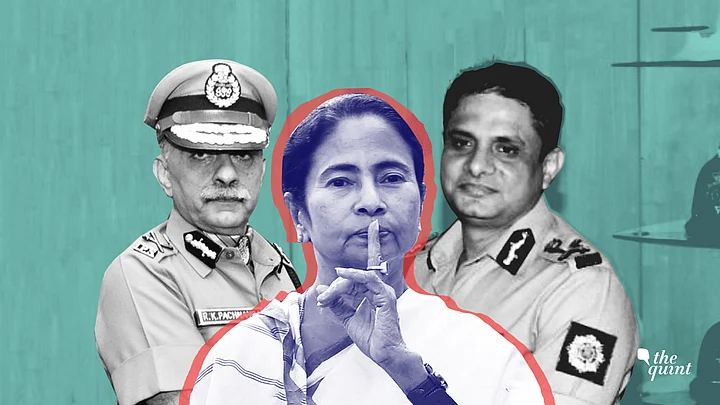If West Bengal Chief Minister Mamata Banerjee was into Facebook trends, a ‘six-year challenge’ would have been apt today. In six years, Banerjee’s see-saw relationship with Kolkata Police commissioners seems to have reached full circle.
Banerjee came to police commissioner Rajeev Kumar’s rescue on Sunday, 3 February, launching an optic-heavy dharna. But nearly six years earlier, on 12 February 2013, the chief minister had dismissed then Kolkata Police Commissioner Ranjit Pachnanda and transferred him overnight.
If Kumar got Mamata’s full support against “worst kind of political vendetta”, Pachnanda was shunted out for refusing to buckle under alleged political pressure after a sub-inspector was shot dead in broad daylight in Kolkata’s port area.
If Sunday was witness to the drama of CBI turning up at the commissioner’s residence and being detained by the police, February 2013 saw unprecedented visuals of a sub-inspector’s murder by assailants allegedly linked to the Trinamool Congress. The killing was caught on camera by a news channel.
What followed over the next 48 hours was nothing short of a stand-off between the police force and the state administration. As commissioner, Pachnanda had to make a choice between standing by his demoralised force or follow political diktats of going easy on the prime accused – an influential Trinamool leader Mohammad Iqbal.
(The following video contains graphic images. Viewer discretion is advised.)
The High Drama of Feb 2013: Mamata vs Commissioner
All the elements surrounding the transfer of Pachnanda in 2013 make for a winning movie script – a tense college election in a politically-sensitive part of Kolkata, a brazen assassin shoots an inspector on camera, a demoralised police force on the verge of mutiny and a commissioner trapped in an professional dilemma.
In the context of what went down on Sunday, it is useful to see how a similar event unfolded in 2013.
12 February: There is heavy police ‘bandobast’ for student elections at Hari Mohan Ghose College in Kolkata, a city well acquainted with political violence in educational institutions. The college is located in Garden Reach – also a politically sensitive part of the city and a Trinamool stronghold.
12 February, 11:40 am: Shortly after students affiliated to the Congress and the CPI(M) clash with Trinamool union students, a gunshot rips through the chaos. A youth, later identified as Sheikh Subhan, is caught on camera wielding a one-shot revolver at Sub-Inspector Tapas Chowdhury of the Special Branch. The police officer is shot in the chest from close range and collapses in a pool of blood.
12 February, 5:00 pm: After an initial few hours of stunned inactivity, Kolkata Police swings into spirited action, arresting 12 people, most of whom were associated with the ruling party. An FIR filed by the police refers to Iqbal, a Trinamool councillor from Garden Reach who is accused of masterminding the attack. He was close to senior Trinamool leader and then Urban Development Minister Firhad Hakim (now Kolkata Mayor).
13 February: The action shifts to slain inspector Chowdhury’s house where Trinamool, CPI(M), Congress leaders troop in to pay their condolences to his family. In the background, however, pressure is building on former Police Commissioner Pachnanda to keep Iqbal out of the scene and instead name Mukhtar, a Congress leader as an accused, according to a report in the The Telegraph.
14 February: Banerjee, who was away from Kolkata, returns to the city and a bitter break-up ensues. Pachnanda is transferred from his position as police commissioner after he decides to go after Iqbal.
The Telegraph quotes a senior police officer as telling Pachnanda on the eve of the top cop’s transfer:
“Sir, we have to act now or the morale of the police will collapse. A sub-inspector has been killed on duty and there can be no further excuse for us.”
According to an India Today report, Mamata Banerjee said that the transfer for because of the police’s failure to apprehend the culprits. "I had to take such a strong action because the criminals were not arrested in time. If they were in the other side of the world even, they should have been arrested."
14 February: The drama becomes murkier as then Bengal Governor MK Narayanan, a former top cop and intelligence czar, does not mince his words in delivering a damning rebuke to Banerjee. “There may be several reasons why a police commissioner is removed. But if he is removed for what happened in the last few days, quite clearly there is something wrong and we need to look at them,” Narayanan had said, according to another report by The Telegraph.
Notably, on 9 January this year, Pachnanda – who is a retired officer – was appointed the security adviser to the BJP-led government in Assam, which means that he reports directly to Chief Minister Sarbananda Sonowal.
Cut to February 2019: Mamata ‘Protects’ Commissioner
It is 2019 and Rajeev Kumar is commissioner of Kolkata Police. Soon after CBI officers turn up at Kumar’s Loudon Street residence at 6:10 pm, they are detained. Banerjee rushes to Kumar’s residence at 7:30 pm for a meeting.
By 9 pm, the chief minister goes on an indefinite dharna in the heart of Kolkata’s Esplanade area with Kumar by her side. This is the same place where she had launched a hunger strike in 2008 to protest against Singur violence.
Pachnanda’s punishment and Kumar protection illustrates the vital role that the police force plays in the political chessboard of a state. How this strategic move plays out on a chessboard, which is often more grey than black-and-white, is yet to unfold.
(At The Quint, we question everything. Play an active role in shaping our journalism by becoming a member today.)
